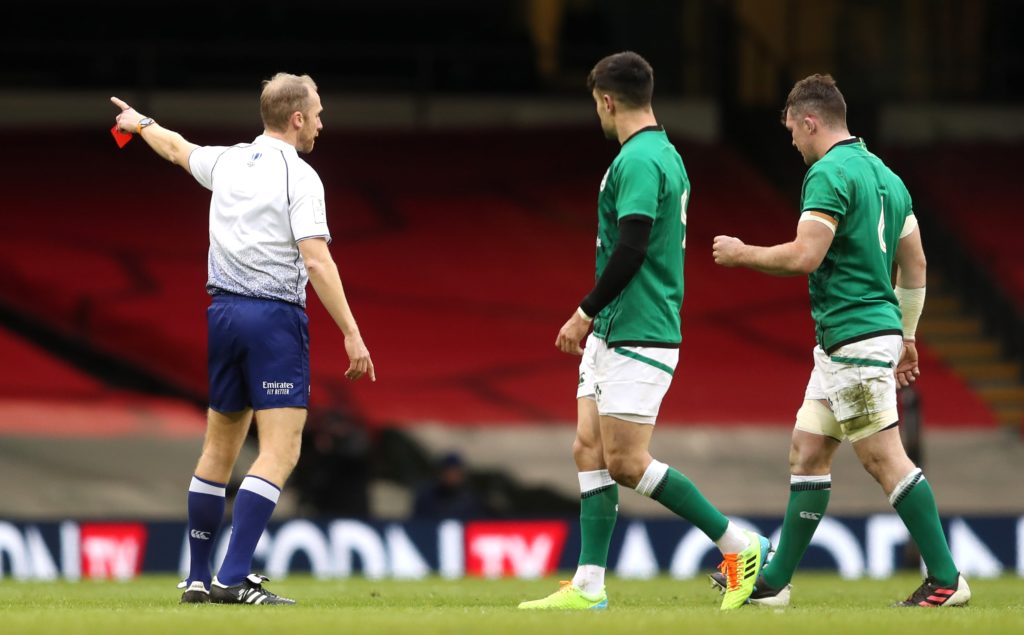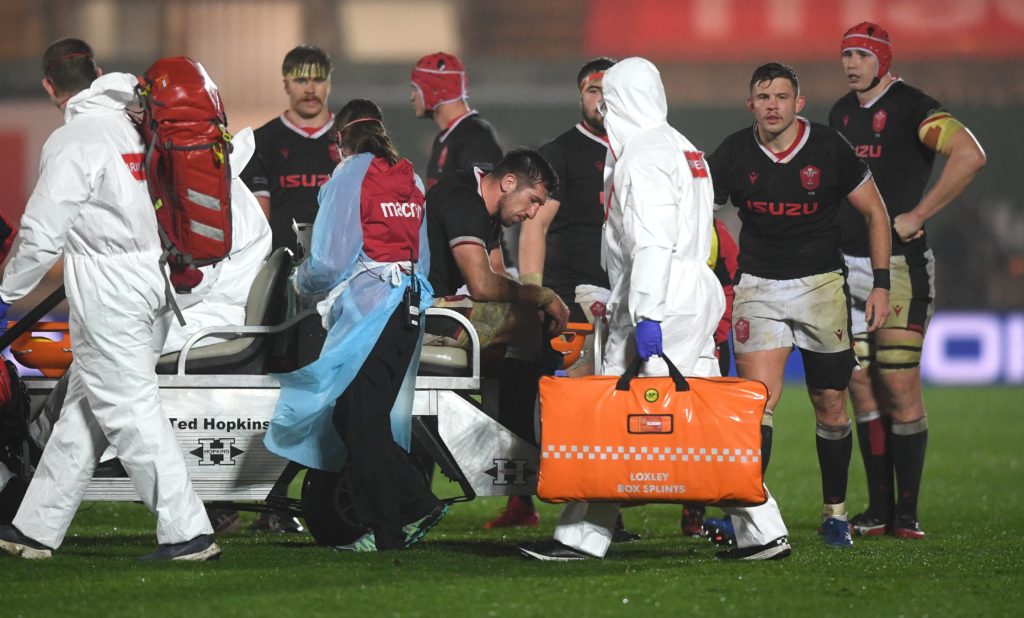Which is more annoying, people complaining that rugby has ‘gone soft’ or people complaining about people complaining rugby has ‘gone soft’? The former, but not by as much as you might think. Both propensities, rife in the past four years, which in rugby have been characterised by a sanctioned explosion in the incidence of red cards, completely miss the more important debate – and wilfully so.
Anyone who tries to argue that rugby is somehow softer than it used to be must know full well the absurdity of that line of argument. Rugby is far, far harder than it has ever been, at every level from schools right up to the top. But we know that is not really what these people are complaining about, so why do they keep saying it?
Likewise, those who rail against those who rail against the softness of the game know full well that is not really the point, but they recognise a winning line of argument when they see one, so they rubbish without fear of rational comeback the self-evident idiocy of those who say rugby is gentler than it used be. All the while, they don’t have to engage with the real argument, which is somewhat more complicated.
The ‘game has gone soft’ argument is often peddled by people who feel pretty hard because back in the day they used to strut the field punching, stamping and gouging with impunity.
First of all, a moment to consider those who play for our entertainment a sport as brutal and unforgiving as any on earth and who don’t so much as throw a slap in anger, no matter that they endure, almost constantly, the sort of physical aggravation that would turn the rest of us into hysterical, slapping banshees after just a minute.
The ‘game has gone soft’ argument is often peddled by people who feel pretty hard because back in the day they used to strut the field punching, stamping and gouging with impunity. They mistake that wanton lack of self-restraint for hardness. They are wrong.
Meanwhile, the modern players engage week after week in what is a perpetually enraging experience, far more so than any previous generation has ever known, and yet – while tens of thousands scream their incitements – they do not for one moment lose their shit. That’s hard. It’s more than hard. It’s noble and heroic.

Well might people get angry, then, when they see the modern breed of hero sent off more often in your average month than the punching, stamping, gouging heroes of yesteryear were in a decade. Cue the facile complaints about the game going soft.
Let’s be charitable. These people don’t really mean the game has gone soft. But they do recognise the niggling feeling that on a profound level the game has become unfair on its players, impossible even. In their struggle to articulate this feeling, they resort to a tired cliché, which hardly does justice to their subject. Worse still, it allows the debate to subside into a bottomless void of petty bickering while the real issue looms vast and unscaled overhead.
The real issue, of course, is that rugby is so hard nowadays it will probably soon be rated a certifiable health risk to its practitioners. And not just any old health risk. This is the most hideous health risk of all, whose realisation involves the relentless erosion of a person’s faculties, of who they are. Unfair indeed.
There are plenty more twists to come in this tale, but there is a real danger rugby comes to think this problem can be solved, or even just alleviated modestly, by recourse to the referee’s pocket. If there is ever to be a way out of this crisis, it will be through the science of biomarkers and maybe even treatment for brain injury; it will be through foundations like those recently set up by and for the players like Head for Change or the lobbying group created this week called Progressive Rugby; it will be through improved management and care.
Don’t let anyone tell you they have made law changes to address rugby’s problems. The law remains exactly the same; they’ve just whacked up the punishments.
Last on the list, and caveated with a whopping ‘maybe’, is law change. That maybe is because the only surefire way to fix this, which is to ban tackling altogether, would be to turn rugby into something else. We shall see if rugby’s administrators are able to solve the almost-impossible conundrum of that other weary cliché, to make the game safer without losing any of the elements that make it rugby, but to date their on-field measures have stretched to wishing more red cards on their own players. And then, to add insult to injustice, banning them as well. Which means rugby’s administrators have chosen to blame the players, when anybody can see the problem is the sport itself.
This is a craven betrayal of good people. Don’t let anyone tell you they have made law changes to address rugby’s problems. The law remains exactly the same; they’ve just whacked up the punishments. We are four years in, and still the red cards keep coming.
It is true that the two we have seen this Six Nations are more conscionable than the most common, which are for high tackles. At least with the dangerous clear-out a player has more than a fraction of a split second to make decisions and move their body accordingly, but it must surely occur to people that if these incidents keep happening there is something unavoidable about them.

Red cards are supposed to serve as a deterrent, which means they should peter out once the message is absorbed. If that is so, they are not working. Invariably the assessment of commentator and fan alike after each one is that there was no intent. If there is no intent there should be no red card, at least in any sport that treats its players with respect.
The options available to a player when confronted by someone jackaling for the ball are becoming increasingly limited. The hypocrisy in rugby means we demand players are committed to the ferocity of the onslaught but expect them to remain immaculate in their decision-making. Zander Fagerson should have overridden the instinct to charge at Wyn Jones last Saturday, but his alternatives were to do nothing or to amble up to Jones in a decidedly uncommitted fashion and explore his person for a safe area on which to bind. By which time the ball would have gone and Fagerson would have likely been pilloried for, well, a lack of commitment.
The red card has become fetishised by all too many as some kind of magic wand that will make brain injury and all its repercussions go away. This is a dangerous illusion.
But we’re getting away from the point. If rugby thinks red cards can absolve the sport of its responsibilities, it totally misunderstands the gravity of the problem. The red card has become fetishised by all too many as some kind of magic wand that will make brain injury and all its repercussions go away. This is a dangerous illusion.
The aim, however crudely, lazily and unjustly it has been pursued, is to lower the height of the tackle, which can also be achieved through education and law change. There has been progress in the former department. It is plausible to argue that the ‘big hit’ to the upper body is indeed no longer cool. But it’s not going to fix anything.
In another article in The XV we have already shown, using World Rugby’s own data, the sort of reduction in head injury assessments we can expect from a lowering of the tackle height. The answer is a best-case scenario of eight per cent. So far, four years into the era of the red card, the incidence of concussion is as high as ever.

Even if it were not, we now know that ‘concussion’, an arbitrarily defined concept at the best of times, represents a small fraction of the problem, which is the repetitive shaking of the brain – the bang, bang, bang of rugby’s signature rhythm. At the CTE Center of Boston University, where more brains of deceased athletes have been dissected than anywhere else, they have discovered limited correlation between the development of CTE (the brain disease once known as dementia pugilistica) and a history of diagnosed concussion. About 20 per cent of those with CTE had no history of concussion at all. But there is a very strong correlation between CTE and length of career in a collision sport.
The occasional ugly head collision of which rugby is now so ashamed, at which in its shame it waves its red cards, has next to no input into the long-term neurodegenerative conditions that are the problem here. Those are likely caused, in hopefully a minority, by long careers, during which the brain is regularly shaken by collisions that do not need to involve contact with the head at all.
Ignore those who say the game has gone soft. They know they’re wrong about that. But that doesn’t mean they are wrong to be uncomfortable with rugby’s headline policy so far in addressing the crisis of brain injury. It is truly unfortunate that the very players who bear all the risk for our entertainment are those whom we also choose to blame for it.
Unfair.
More stories by Michael Aylwin
If you’ve enjoyed this article, please share it with friends or on social media. We rely solely on new subscribers to fund high-quality journalism and appreciate you sharing this so we can continue to grow, produce more quality content and support our writers.


Comments
Join free and tell us what you really think!
Sign up for free